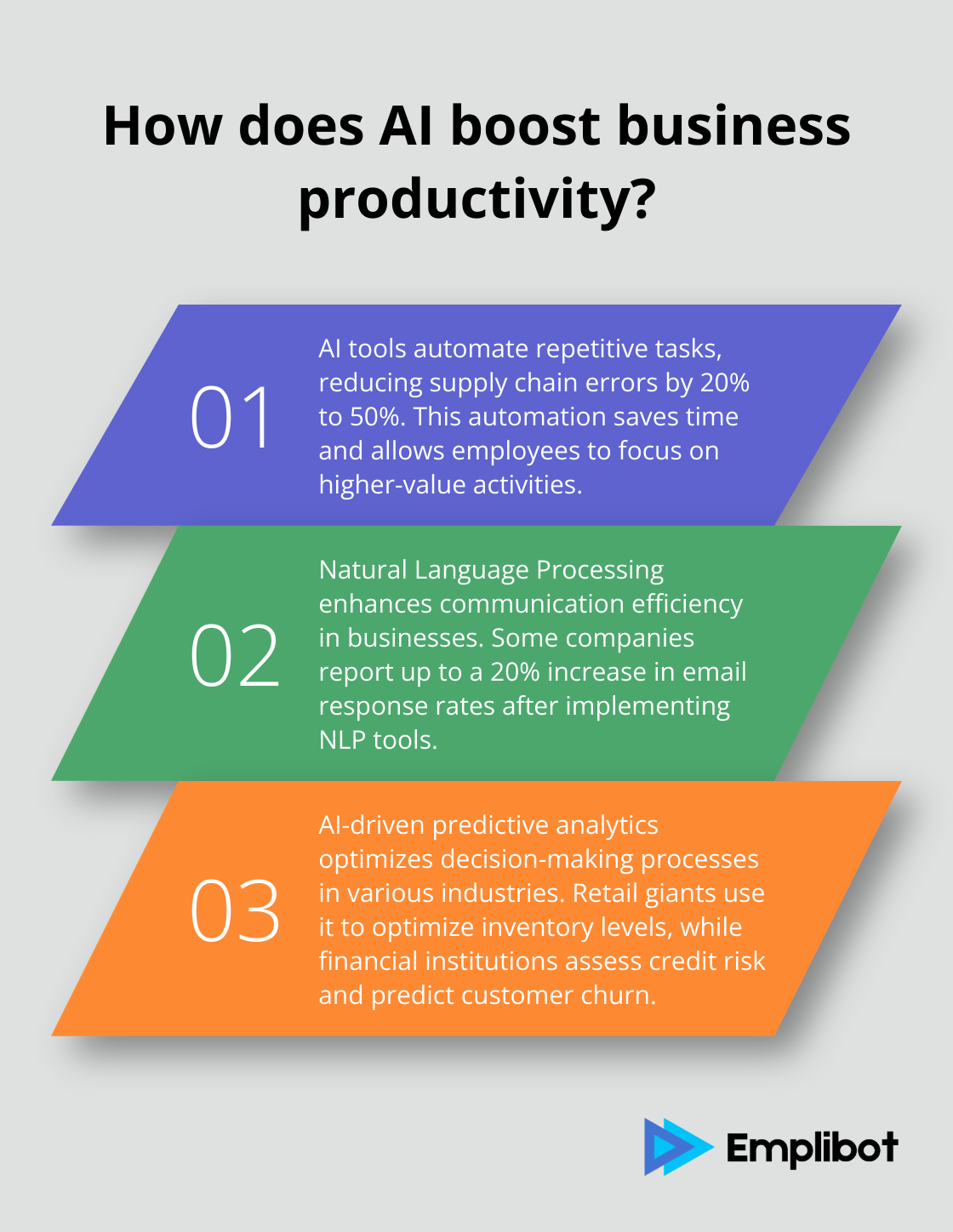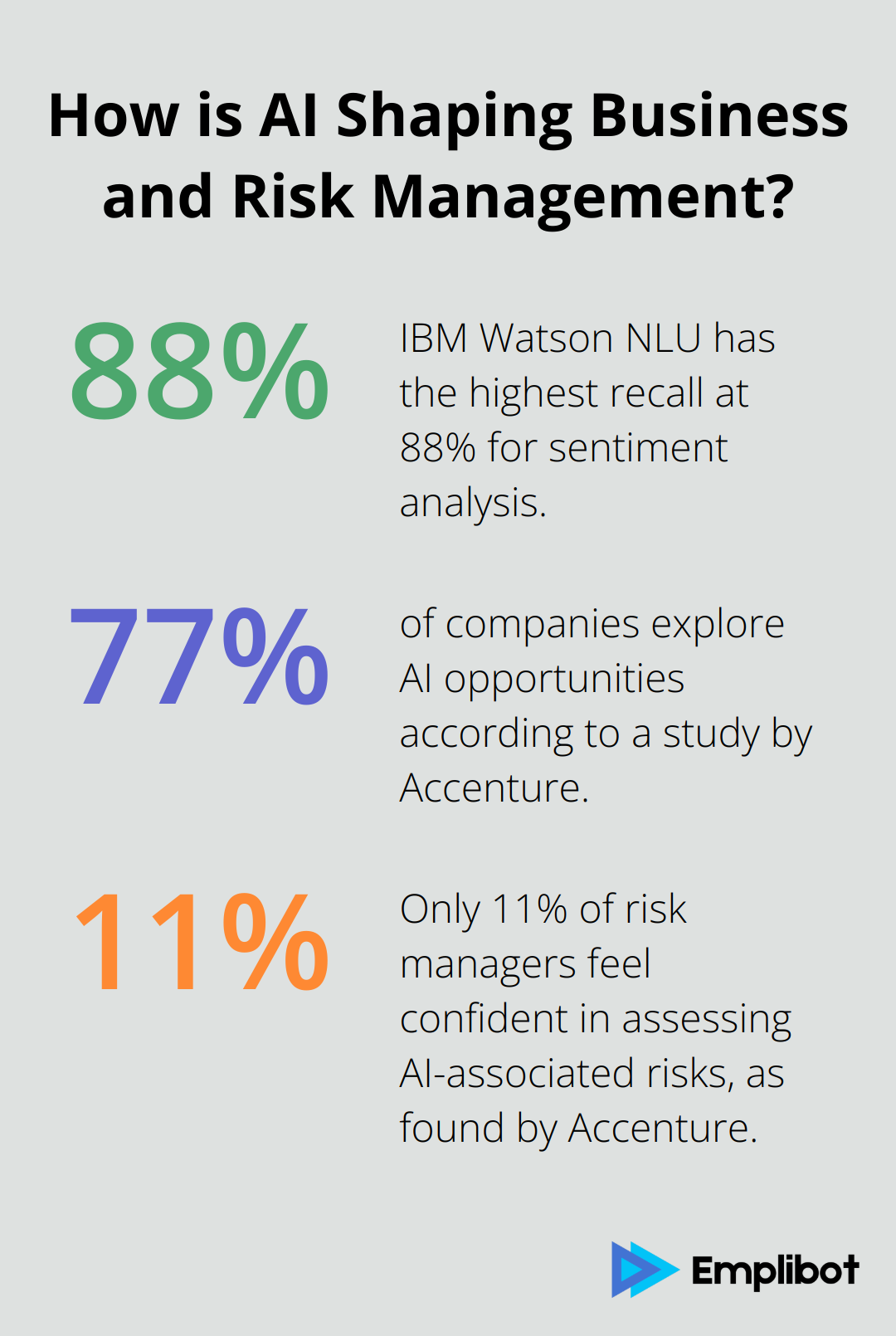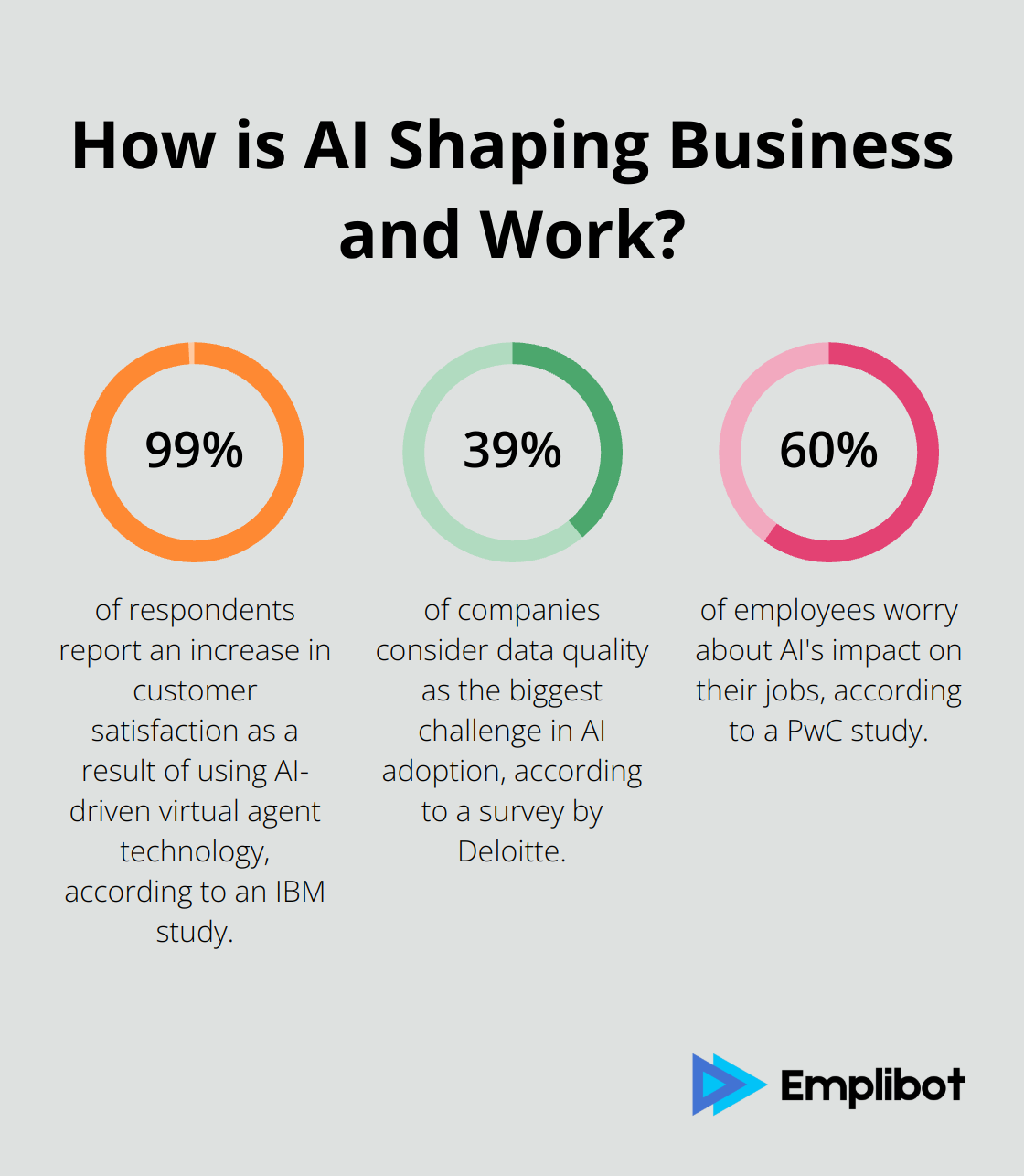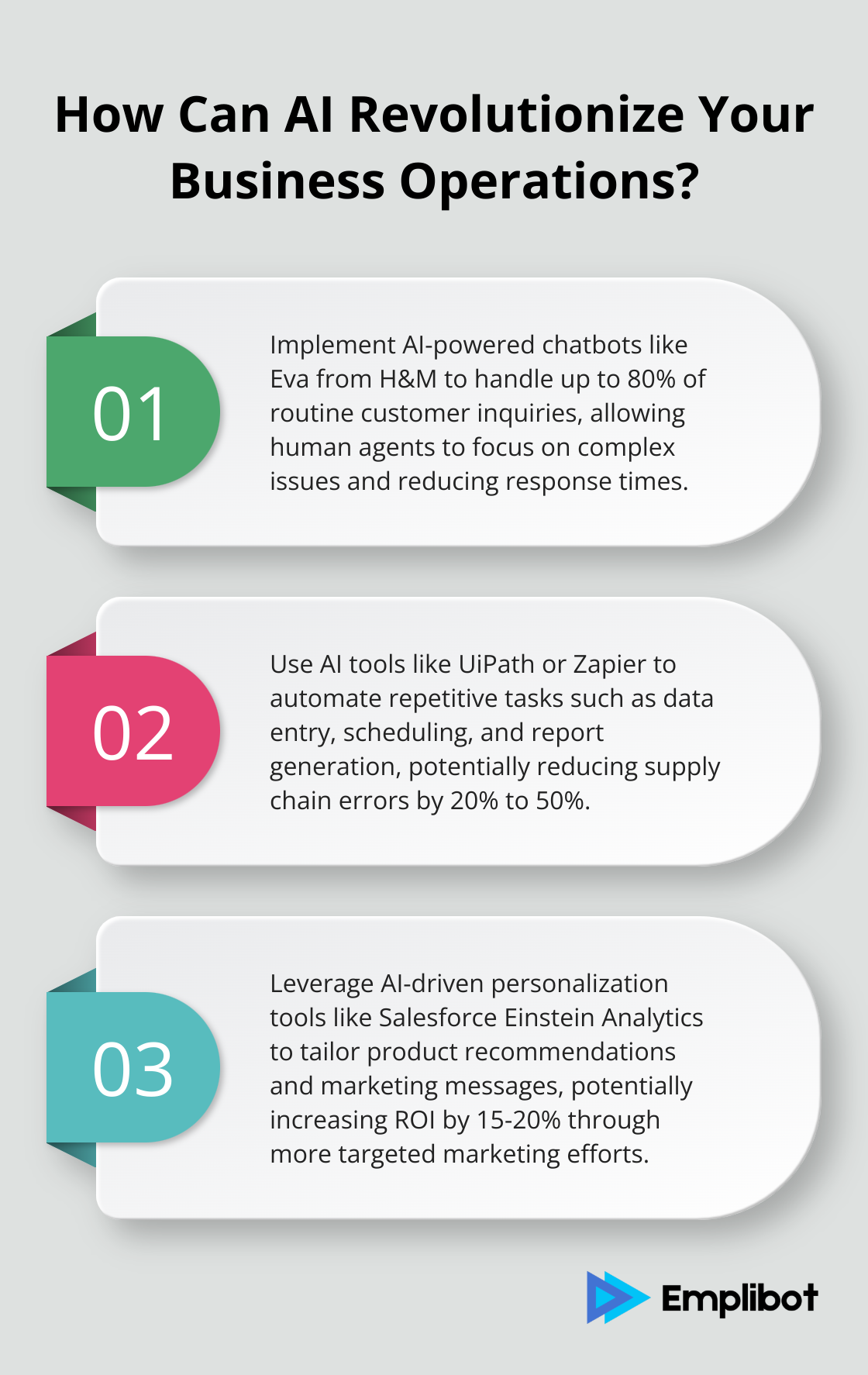AI tools for business are revolutionizing the way companies operate and compete in today’s market. From boosting productivity to enhancing customer experiences, these technologies offer unprecedented opportunities for growth and innovation.
At Emplibot, we’ve seen firsthand how AI can transform businesses of all sizes. This post will guide you through the practical steps to leverage AI tools effectively, helping you stay ahead in an increasingly digital landscape.
How AI Boosts Your Business Productivity
AI tools transform business operations, offering unprecedented opportunities to increase productivity and streamline processes. These technologies revolutionize workflows and decision-making, leading to significant improvements in efficiency and output.
Automating Repetitive Tasks
AI excels at automating mundane, repetitive tasks. Tools like UiPath and Zapier automate data entry, scheduling, and report generation. A McKinsey study reveals that businesses implementing AI-driven automation reduce supply chain errors by 20% to 50%. This automation not only saves time but also allows employees to focus on higher-value activities that require human creativity and problem-solving skills.
Enhancing Communication with NLP
Natural Language Processing (NLP) is a game-changing AI application for business productivity. NLP-powered tools analyze and understand human language, making communication more efficient. AI-driven email filters prioritize important messages, while smart writing assistants (like Grammarly) help employees communicate more effectively. Some companies report up to a 20% increase in email response rates after implementing NLP tools to optimize their communication strategies.
Data-Driven Decision Making
Predictive analytics stands out as one of the most powerful AI tools for increasing productivity in decision-making processes. AI identifies patterns and trends in vast amounts of historical data that humans might miss. Retail giants like Walmart use predictive analytics to optimize inventory levels based on customer purchasing behaviors, reducing overstock and stockouts. Financial institutions leverage classification algorithms to assess credit risk and predict customer churn, allowing for more informed and faster decision-making.
Implementing AI in Your Business
To leverage these AI tools effectively, businesses must identify areas where automation can have the most significant impact. This process involves assessing current workflows, pinpointing bottlenecks, and considering where AI could streamline processes. Successful AI integration requires a strategic approach and often a cultural shift within the organization.

While many AI tools are available, it’s important to choose solutions that align with specific business needs. For content marketing automation, Emplibot offers a comprehensive solution that handles everything from keyword research to content creation and distribution. This allows businesses to increase their online presence and engage with customers more effectively, all while saving valuable time and resources.
As we explore the potential of AI in business, it’s clear that its impact extends beyond productivity. In the next section, we’ll examine how AI enhances customer experience, creating more personalized and efficient interactions that drive business success.
How AI Transforms Customer Interactions
AI technologies revolutionize how companies interact with their customers, offering personalized services and streamlining communication processes. This transformation enhances customer experiences and drives business success in today’s competitive landscape.
Tailoring Experiences with AI
AI-driven personalization has become a game-changer for businesses aiming to enhance customer satisfaction. Recent findings indicate that AI personalization significantly enhances user experience, increases conversion rates, and fosters brand loyalty. This level of personalization improves customer experience and significantly boosts sales.

Companies can implement AI-powered personalization by analyzing customer data to identify patterns in purchasing behavior. Salesforce Einstein Analytics offers predictive insights that help tailor product recommendations and marketing messages to individual customers. Companies that implement these AI solutions report up to a 15-20% increase in ROI through more targeted marketing efforts.
24/7 Customer Support with AI
AI-powered chatbots and virtual assistants transform customer service by providing instant, round-the-clock support. H&M’s AI chatbot, Eva, exemplifies this trend. Eva handles a wide range of customer inquiries (from product information to order tracking), significantly reducing response times and improving overall customer satisfaction.
Implementing an AI chatbot doesn’t require complex solutions. Platforms like Intercom or Drift offer user-friendly options that integrate with existing customer service systems. These tools can handle up to 80% of routine customer inquiries, allowing human agents to focus on more complex issues.
Understanding Customer Sentiment
Sentiment analysis, powered by AI, allows businesses to gauge customer opinions and emotions at scale. This technology analyzes customer feedback from various sources (including social media, reviews, and support tickets), providing valuable insights into customer satisfaction and areas for improvement.
IBM Watson and Google Cloud Natural Language API offer robust sentiment analysis capabilities. A recent study found that IBM Watson NLU has the highest recall at 88%, while Google Cloud Natural Language API also offers comparably high coverage. By implementing these solutions, businesses can proactively address customer concerns, improve products or services based on feedback, and ultimately enhance customer loyalty.
A study by Accenture found that 77% of companies explore AI opportunities, yet only 11% of risk managers feel confident in assessing the associated risks. This gap underscores the importance of careful AI solution implementation, particularly when dealing with sensitive customer data.
The next section will examine how to effectively implement AI in various business operations, ensuring a smooth integration that maximizes benefits while minimizing disruption. This approach will help businesses fully leverage AI’s potential across all aspects of their operations.
How to Implement AI in Your Business
Identify High-Impact Areas for AI
The first step in AI implementation requires you to pinpoint areas where it can make the most significant difference. Analyze your current processes and identify bottlenecks or inefficiencies. Look for tasks that are repetitive, time-consuming, or prone to human error. These often become prime candidates for AI automation.

If your customer service team spends hours each day answering routine queries, an AI chatbot could add value. A study by IBM found that 99% of respondents report an increase in customer satisfaction as a result of using AI-driven virtual agent technology.
Select the Right AI Tools
After you identify potential areas for AI integration, choose the right tools. The market offers numerous AI solutions, so select ones that align with your specific needs and goals.
Consider factors such as scalability, integration capabilities with your existing systems, and the level of customization offered. Opt for solutions with strong security measures, especially when dealing with sensitive data.
For content marketing, Emplibot stands out as a comprehensive solution. It handles everything from keyword research to content creation and distribution, making it an ideal choice for businesses looking to boost their online presence without extensive manual effort.
Prepare Your Data
AI implementation success relies heavily on the quality and quantity of available data. Before you deploy any AI solution, ensure your data is clean, organized, and accessible. This may involve consolidating data from various sources, removing duplicates, and standardizing formats.
A survey by Deloitte found that 39% of companies consider data quality as the biggest challenge in AI adoption. Time invested in data preparation can significantly improve the accuracy and effectiveness of your AI tools.
Train Your Team
Successful AI implementation isn’t just about technology-it also involves people. Your employees need to understand how to work alongside AI tools effectively. Provide comprehensive training on the new AI systems and emphasize how these tools will enhance (not replace) their roles.
A PwC study revealed that 60% of employees worry about AI’s impact on their jobs. Address these concerns by highlighting how AI can take over mundane tasks, allowing employees to focus on more strategic, creative work.
Start Small and Scale Up
Instead of attempting a company-wide AI overhaul, start with a pilot project in one department or for a specific process. This approach allows you to test solutions on a smaller scale, identify potential challenges, and make necessary adjustments before scaling up.
You might begin by implementing AI-powered analytics in your marketing department to optimize campaign performance. Once you’ve seen success and ironed out any kinks, you can expand to other areas of the business.
Final Thoughts
AI tools for business have transformed company operations, offering unparalleled opportunities for growth and innovation. These technologies enhance productivity, decision-making, and customer engagement, with companies reporting significant improvements in ROI and customer satisfaction. The future of AI in business looks promising, with advancements in natural language processing and predictive analytics on the horizon.

Companies that want to leverage AI should identify areas where it can have the most significant impact. This involves analyzing current processes and considering where AI could streamline operations. Choosing the right AI tools is essential, and solutions like Emplibot offer comprehensive content marketing automation.
Successful AI implementation requires proper data preparation and team training. Companies should start with small pilot projects and gradually scale up their AI initiatives. AI will not replace human workers but will augment their capabilities, allowing them to focus on more strategic tasks.

